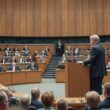The German Council of Economic Experts (Sachverständigenrat) delivered its annual assessment to Chancellor Friedrich Merz (CDU) this Wednesday, highlighting a tentative shift from recession to positive economic growth, albeit lagging behind European peers. Council Chair Monika Schnitzer underscored a crucial need for sustained productivity gains through innovation and investment to secure a robust and future-proof economic trajectory for Germany.
The report acknowledges the potential of the recently approved financial package, but voices significant concerns about its effectiveness. Schnitzer explicitly warned that the anticipated growth impacts could be substantially diminished if the current allocation plan persists, with a concerning proportion of funds earmarked for non-investment expenditures. A critical adjustment of this strategy is being urged to truly maximize the package’s potential.
Beyond the immediate financial measures, the Council advocates for a comprehensive overhaul of corporate taxation to improve the investment climate. A key element of this reform includes proposals aimed at facilitating wealth accumulation within lower-income brackets, coupled with a call for a more equitable taxation of inheritance and gifts, advocating for reduced benefits offered to business assets. This perspective directly confronts the existing wealth distribution disparities within Germany.
Chancellor Merz, accepting the report, expressed alignment with the Council’s diagnosis, emphasizing the necessity of investment and innovation to revitalize Germany’s economic performance. He conceded that previous practices involving unsustainable use of national reserves have depleted these resources and pledged to improve the investment conditions for businesses. Merz also addressed the critical issue of energy costs, acknowledging the burden they place on German companies and affirming the government’s commitment to finding solutions, both domestically and within the European Union.
However, the Council’s assessment implicitly criticizes the government’s historical economic policy, pointing to a reliance on unsustainable practices that have now exhausted vital resources. The implicit caution within the report suggests that the current trajectory, even with the newly approved measures, requires a more fundamental re-evaluation and a more aggressive approach to long-term reform if Germany is to regain its competitive edge and ensure lasting economic stability. The Council’s stark warning points to a critical juncture for Germany’s economic future, demanding decisive action and a willingness to challenge established norms.





